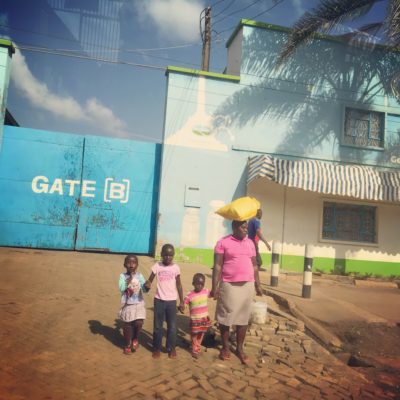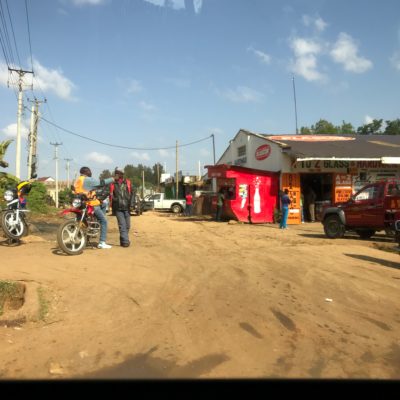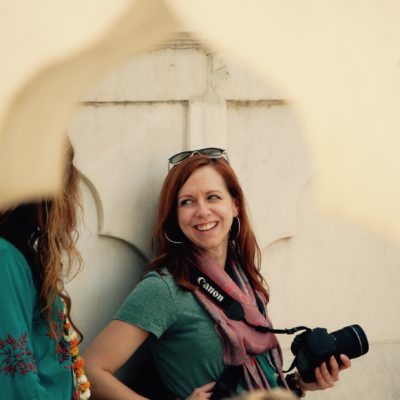What Will You Do With Your Privilege?
 The road undulates beneath me. Gravel, mud, and the remnants of last night’s rain have the taxi swaying through a curtain of trees. My stomach tilts and a metallic taste rises up in my throat. With clammy skin and heavy eyes, I count to ten and try to will the nausea to subside. It has been over an hour since we left behind the bustle of Eldoret with its motorcycles, families of pedestrians, and multitude of construction sites and I am silently longing for the chance to return back and to crawl into bed. My body is weak from the Cipro I took to deal with the travelers diarrhea that caught up with me overnight – an unfortunate byproduct to life on the road. But, rescheduling this visit is not an option, so I take a sip of water and wrap my fingers around the handle above the window as I remind myself that this feeling is not permanent.
The road undulates beneath me. Gravel, mud, and the remnants of last night’s rain have the taxi swaying through a curtain of trees. My stomach tilts and a metallic taste rises up in my throat. With clammy skin and heavy eyes, I count to ten and try to will the nausea to subside. It has been over an hour since we left behind the bustle of Eldoret with its motorcycles, families of pedestrians, and multitude of construction sites and I am silently longing for the chance to return back and to crawl into bed. My body is weak from the Cipro I took to deal with the travelers diarrhea that caught up with me overnight – an unfortunate byproduct to life on the road. But, rescheduling this visit is not an option, so I take a sip of water and wrap my fingers around the handle above the window as I remind myself that this feeling is not permanent.
The roller coaster finally ends as the driver pulls through the clearing and onto a patch of grass. We step out and someone greets us and ushers us into a pristinely cleaned building. The first stop is a narrow staff kitchen where the tap is opened and we are requested to wash our hands and then we shuffle into a small office. A thermos appears and an arc of milky Kenyan tea lands in the cup in front of me. Across the desk, our host lights up with pride as he tells us about this 24-bed in-patient and out-patient hospice for adults and children living with life-threatening illness – one of only two hospices in the entire country.
After our orientation, we pass through the first building and onto a cement breezeway framed on either side with perfectly manicured trees – each sharing its plot of soil with a sign marking the name of the individual or company whose donation has helped to provide this sanctuary. As we step into the second building, a young doctor greets us. With a radiant smile that stretches to light up her eyes, she tells us a bit about the facility and offers to introduce us to their guests – they don’t use the word patient. Whether it is with kids toddling on the front porch, the guests confined to their beds, or the family members and residents basking in the sun outside, her every word and action is infused with compassion. Even though I know this building is the final stop on earth for many of these guests, I am lulled by the beauty of the grounds and the way the young resident holds a hand, straightens a gown, or squeezes a shoulder – each time reaffirming that in spite of everything, he or she is “doing good.” Even while seeing gaunt faces and hearing stories of grim prognosis’s, I can almost trick myself into believe everyone is somehow OK.
Then we step through a door marked staffroom and I feel like we are stepping back in time. Hidden behind a massive oxygen tank system is a bed tucked under the window. As our eyes adjust to the light, I see the shell of a woman, her tiny face and spindly frame beaded in sweat. She cries out in pain as the whites of her eyes flash towards us. The sound of her pain is so guttaral that the clamminess I felt earlier floods over me and I wrestle with my desire to flee. The doctor asks us to wait while she leaves the room to find gloves and some gauze. The seconds stretch into a lifetime of minutes and I grapple with my feelings of inadequacy at the tremendous effort it takes for me to remain in the room. I want so desperately to escape from this moment. To disconnect from the visceral experience of humanity at its most painful.
When the doctor finally returns and tenderly dabs the woman’s forehead and adjusts her morphine levels, I am in awe of her grace. And, I am flooded with gratitude for the people who have brought this hospice to life and for all they do to serve people who have no one. The depth of their conviction brings home the tremendous need for more support like this. The doctor shares that this woman is the mother of two of the toddlers I met when we walked in. I can’t reconcile this information. It doesn’t seem possible that this aged woman is likely younger than me. How is that possible?
 How many young mothers will leave behind children because cancer or HIV or TB will snuff out their light? How many children will grow up without a mother to nurture them? How many people will die alone because incredible organizations like this one can’t possibly service the extent of the need here? In an instant my earlier complaints of fatigue from a minor case of diarrhea are put into perspective. The magnitude of my privilege seeps through my bones. I have my health and family and friends who love me. I won the geographic lottery in terms of an early diagnosis and state-of-the-art treatment for cancer. I have doors that open for me – quite literally – because of the color of my skin.
How many young mothers will leave behind children because cancer or HIV or TB will snuff out their light? How many children will grow up without a mother to nurture them? How many people will die alone because incredible organizations like this one can’t possibly service the extent of the need here? In an instant my earlier complaints of fatigue from a minor case of diarrhea are put into perspective. The magnitude of my privilege seeps through my bones. I have my health and family and friends who love me. I won the geographic lottery in terms of an early diagnosis and state-of-the-art treatment for cancer. I have doors that open for me – quite literally – because of the color of my skin.
I am still processing all I experienced that day, but on the bumpy drive back, I couldn’t help but think about the privilege so many of us take for granted. Whether it’s the privilege of health, wealth, geography, race, or connections with friends or family – we all have some kind of privilege other people would long for. I can’t wrap my head around the inequality of privilege. How is it that a young single blind mother lays alone dying of HIV because treatment failed her and I am healthy and have the opportunity to imagine a beautiful future? How can I make sure I never take my privilege(s) for granted? How can I use my privilege to bring more light to the world?
Terri spent two weeks in Kenya exploring how we might collaborate with local organizations and leaders to bring A Fresh Chapter to this beautiful country. To catch up on her journey, check out her instagram feed – @terriwingham.



No Comments